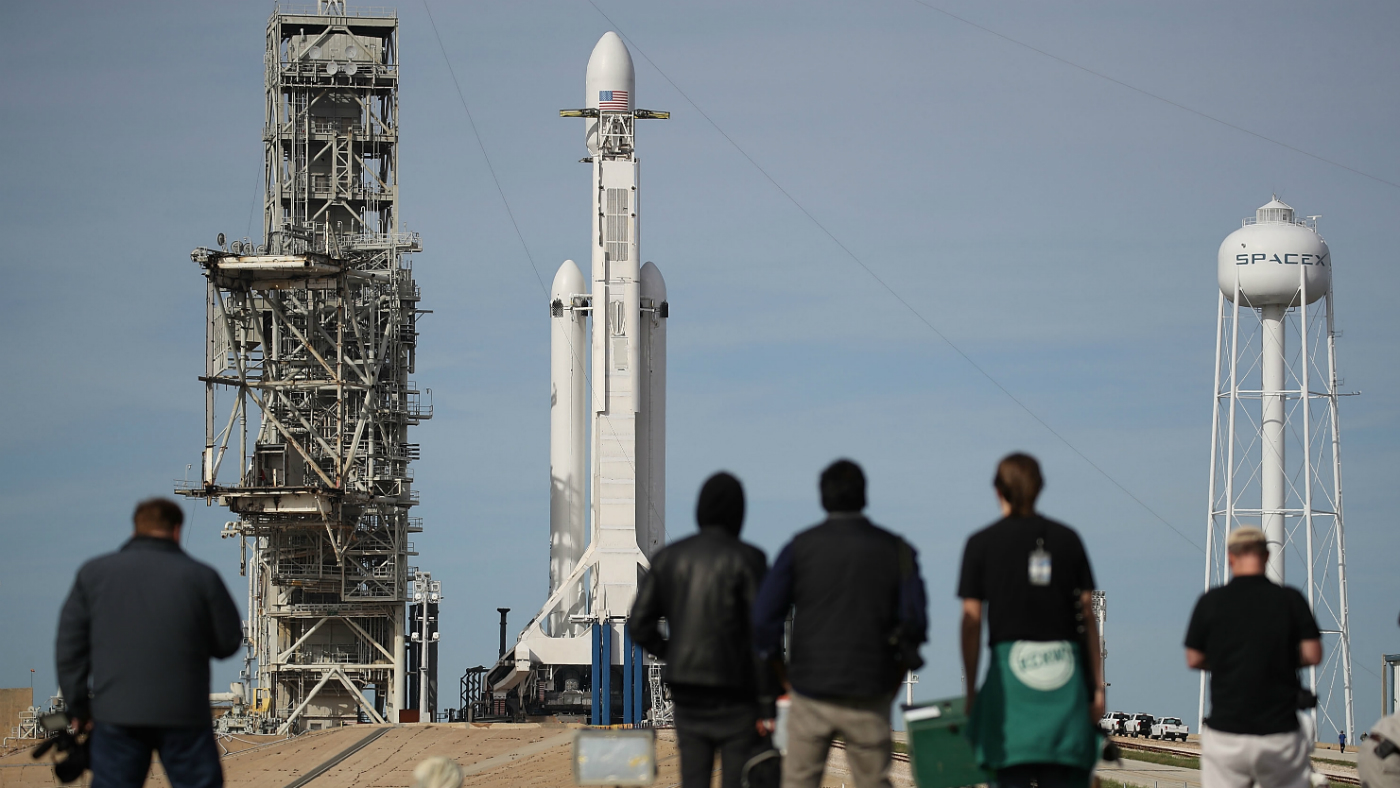Falcon Heavy: five fast facts about Elon Musk’s SpaceX rocket test
World’s most powerful rocket set for launch in Florida today

A free daily email with the biggest news stories of the day – and the best features from TheWeek.com
You are now subscribed
Your newsletter sign-up was successful
Elon Musk’s private space company SpaceX is due to launch its Falcon Heavy rocket later today at the Kennedy Space Center in Florida.
The most powerful heavy-lift orbital rocket in history is scheduled to lift off at 1:30pm local time (6:30pm GMT), although that could be delayed by several hours for technical reasons.
“People [have come] from all around the world to see what will either be a great rocket launch or the best fireworks display they’ve ever seen,” Musk told CNN.
The Week
Escape your echo chamber. Get the facts behind the news, plus analysis from multiple perspectives.

Sign up for The Week's Free Newsletters
From our morning news briefing to a weekly Good News Newsletter, get the best of The Week delivered directly to your inbox.
From our morning news briefing to a weekly Good News Newsletter, get the best of The Week delivered directly to your inbox.
Here are five fast facts about the Falcon Heavy:
The rocket has 27 Merlin engines
The Falcon Heavy is powered by 27 Merlin engines - three times the number of engines in a Falcon 9 rocket - which generate a total five million pounds of thrust, reports TechCrunch. This is enough launch power to lift around 119,000lb (54 tonnes).
“That gives it more than double the total freight moving power of its next closest competitor,” says the website. “In fact, the last active rocket with a greater payload capacity was Nasa’s Saturn V rocket, which flew its last mission in 1973.”
A free daily email with the biggest news stories of the day – and the best features from TheWeek.com
Musk has chosen a quirky payload
Falcon Heavy will not actually be carrying anything heavy into orbit - at least, not today. The rocket has the power to lift almost 141,000lb (64 tonnes), a mass greater than a 737 jetliner loaded with passengers, crew, luggage and fuel, according to the SpaceX website.
But Musk has decided that the payload for the test flight should be his old cherry-red Tesla roadster, with a space-suited mannequin strapped in the driver’s seat.
“[The roadster will] get about 400 million km away from Earth, and it'll be doing 11km/s,” Musk said, according to the BBC. “We estimate it will be in that orbit for several hundred million years, maybe in excess of a billion years.”
Destination: Mars
The rocket - the height of a 23-storey building - “was designed from the outset to carry humans into space and restores the possibility of flying missions with crew to the Moon or Mars”, says the SpaceX website. On its maiden voyage, it will be taking Musk’s red Tesla car into orbit around the red planet.
“If all goes according to plan, the roadster will enter heliocentric orbit (locked in a dance with our sun) and will travel slightly farther than the distance of Mars’ orbit,” the PBS NewsHour website reports.
Chances of success?
“It’s going to be an exciting success or an exciting failure,” Musk said in a conference call yesterday, reports Reuters.
Even if the Falcon Heavy explodes - a scenario that Musk has joked about in tweets - the founder of SpaceX has revitalised the aerospace industry in Florida, which was nearly wiped out by the shutdown of Nasa’s space shuttle programme, the Tampa Bay Times says.
Ground Control to Major Tom
David Bowie’s hit song Space Oddity will be looping on the car’s audio system as the vehicle is hurled into an elliptical orbit that stretches out to Mars’ orbit around the Sun.
-
 The ‘ravenous’ demand for Cornish minerals
The ‘ravenous’ demand for Cornish mineralsUnder the Radar Growing need for critical minerals to power tech has intensified ‘appetite’ for lithium, which could be a ‘huge boon’ for local economy
-
 Why are election experts taking Trump’s midterm threats seriously?
Why are election experts taking Trump’s midterm threats seriously?IN THE SPOTLIGHT As the president muses about polling place deployments and a centralized electoral system aimed at one-party control, lawmakers are taking this administration at its word
-
 ‘Restaurateurs have become millionaires’
‘Restaurateurs have become millionaires’Instant Opinion Opinion, comment and editorials of the day
-
 Epstein files topple law CEO, roil UK government
Epstein files topple law CEO, roil UK governmentSpeed Read Peter Mandelson, Britain’s former ambassador to the US, is caught up in the scandal
-
 Iran and US prepare to meet after skirmishes
Iran and US prepare to meet after skirmishesSpeed Read The incident comes amid heightened tensions in the Middle East
-
 Grok in the crosshairs as EU launches deepfake porn probe
Grok in the crosshairs as EU launches deepfake porn probeIN THE SPOTLIGHT The European Union has officially begun investigating Elon Musk’s proprietary AI, as regulators zero in on Grok’s porn problem and its impact continent-wide
-
 Israel retrieves final hostage’s body from Gaza
Israel retrieves final hostage’s body from GazaSpeed Read The 24-year-old police officer was killed during the initial Hamas attack
-
 China’s Xi targets top general in growing purge
China’s Xi targets top general in growing purgeSpeed Read Zhang Youxia is being investigated over ‘grave violations’ of the law
-
 Panama and Canada are negotiating over a crucial copper mine
Panama and Canada are negotiating over a crucial copper mineIn the Spotlight Panama is set to make a final decision on the mine this summer
-
 Why Greenland’s natural resources are nearly impossible to mine
Why Greenland’s natural resources are nearly impossible to mineThe Explainer The country’s natural landscape makes the task extremely difficult
-
 Iran cuts internet as protests escalate
Iran cuts internet as protests escalateSpeed Reada Government buildings across the country have been set on fire